Crown Institute BSBLDR501 Assignment: Emotional Intelligence
VerifiedAdded on 2023/01/23
|16
|3384
|20
Homework Assignment
AI Summary
This assignment, completed for Crown Institute of Business and Technology's BSBLDR501 module, delves into the multifaceted aspects of emotional intelligence (EI) within a professional context. It begins with personal reflections on emotional experiences, exploring how emotions are described, their origins, and effective coping mechanisms. The assignment then examines the impact of mood on workplace performance, both individually and within a team setting, and suggests strategies for managing emotions to enhance team productivity. Further, it addresses practical scenarios, such as responding to workplace stress, prioritizing tasks, resolving conflicts, and seeking feedback. The document also explores emotional triggers, team dynamics, and the importance of flexibility, adaptability, and social awareness. It concludes with an exploration of leadership styles, particularly focusing on how managers can support team members through organizational change and foster an emotionally healthy work environment. The assignment also covers topics like stress management and conflict resolution, providing a comprehensive overview of EI in the workplace.
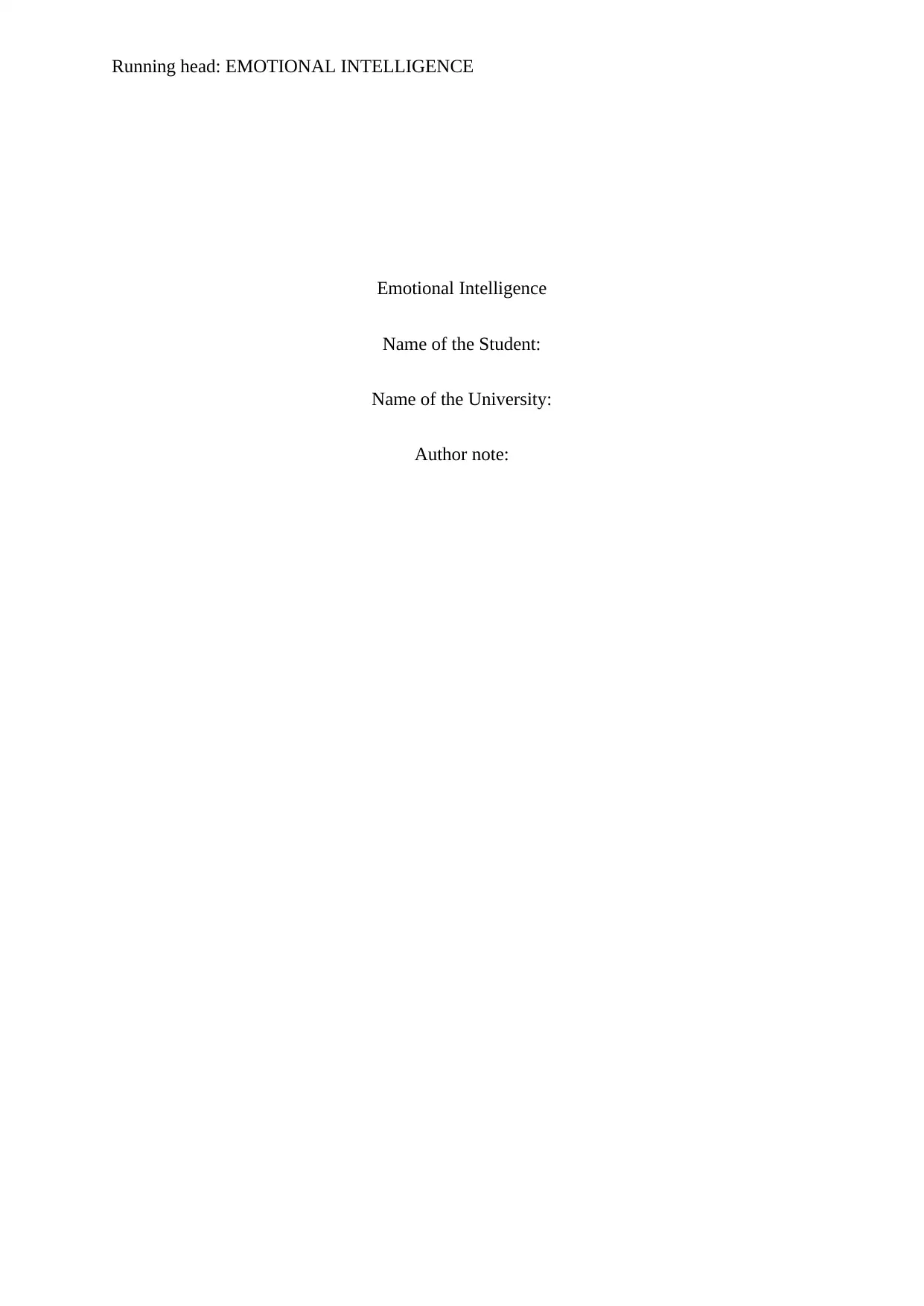
Running head: EMOTIONAL INTELLIGENCE
Emotional Intelligence
Name of the Student:
Name of the University:
Author note:
Emotional Intelligence
Name of the Student:
Name of the University:
Author note:
Paraphrase This Document
Need a fresh take? Get an instant paraphrase of this document with our AI Paraphraser
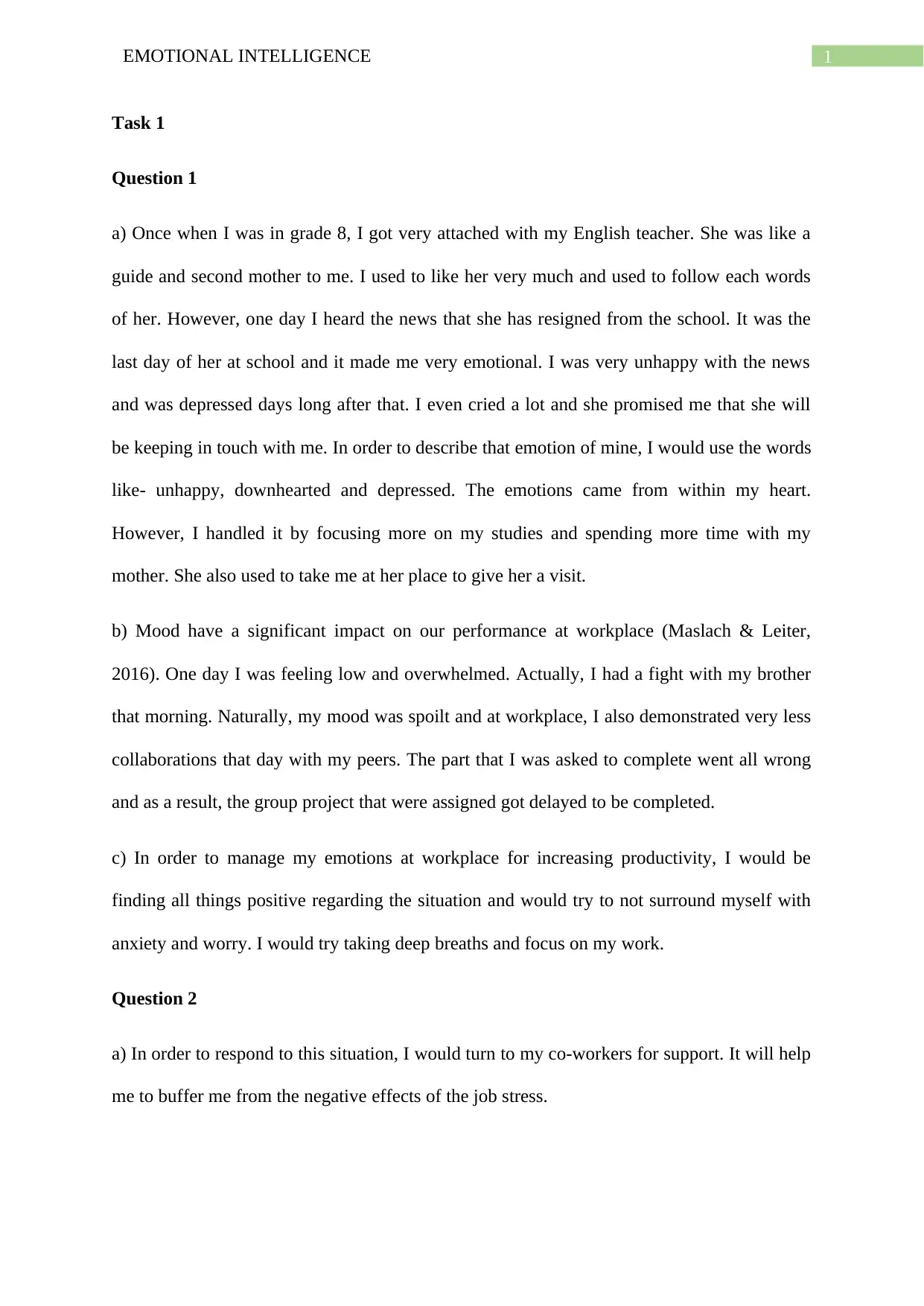
1EMOTIONAL INTELLIGENCE
Task 1
Question 1
a) Once when I was in grade 8, I got very attached with my English teacher. She was like a
guide and second mother to me. I used to like her very much and used to follow each words
of her. However, one day I heard the news that she has resigned from the school. It was the
last day of her at school and it made me very emotional. I was very unhappy with the news
and was depressed days long after that. I even cried a lot and she promised me that she will
be keeping in touch with me. In order to describe that emotion of mine, I would use the words
like- unhappy, downhearted and depressed. The emotions came from within my heart.
However, I handled it by focusing more on my studies and spending more time with my
mother. She also used to take me at her place to give her a visit.
b) Mood have a significant impact on our performance at workplace (Maslach & Leiter,
2016). One day I was feeling low and overwhelmed. Actually, I had a fight with my brother
that morning. Naturally, my mood was spoilt and at workplace, I also demonstrated very less
collaborations that day with my peers. The part that I was asked to complete went all wrong
and as a result, the group project that were assigned got delayed to be completed.
c) In order to manage my emotions at workplace for increasing productivity, I would be
finding all things positive regarding the situation and would try to not surround myself with
anxiety and worry. I would try taking deep breaths and focus on my work.
Question 2
a) In order to respond to this situation, I would turn to my co-workers for support. It will help
me to buffer me from the negative effects of the job stress.
Task 1
Question 1
a) Once when I was in grade 8, I got very attached with my English teacher. She was like a
guide and second mother to me. I used to like her very much and used to follow each words
of her. However, one day I heard the news that she has resigned from the school. It was the
last day of her at school and it made me very emotional. I was very unhappy with the news
and was depressed days long after that. I even cried a lot and she promised me that she will
be keeping in touch with me. In order to describe that emotion of mine, I would use the words
like- unhappy, downhearted and depressed. The emotions came from within my heart.
However, I handled it by focusing more on my studies and spending more time with my
mother. She also used to take me at her place to give her a visit.
b) Mood have a significant impact on our performance at workplace (Maslach & Leiter,
2016). One day I was feeling low and overwhelmed. Actually, I had a fight with my brother
that morning. Naturally, my mood was spoilt and at workplace, I also demonstrated very less
collaborations that day with my peers. The part that I was asked to complete went all wrong
and as a result, the group project that were assigned got delayed to be completed.
c) In order to manage my emotions at workplace for increasing productivity, I would be
finding all things positive regarding the situation and would try to not surround myself with
anxiety and worry. I would try taking deep breaths and focus on my work.
Question 2
a) In order to respond to this situation, I would turn to my co-workers for support. It will help
me to buffer me from the negative effects of the job stress.
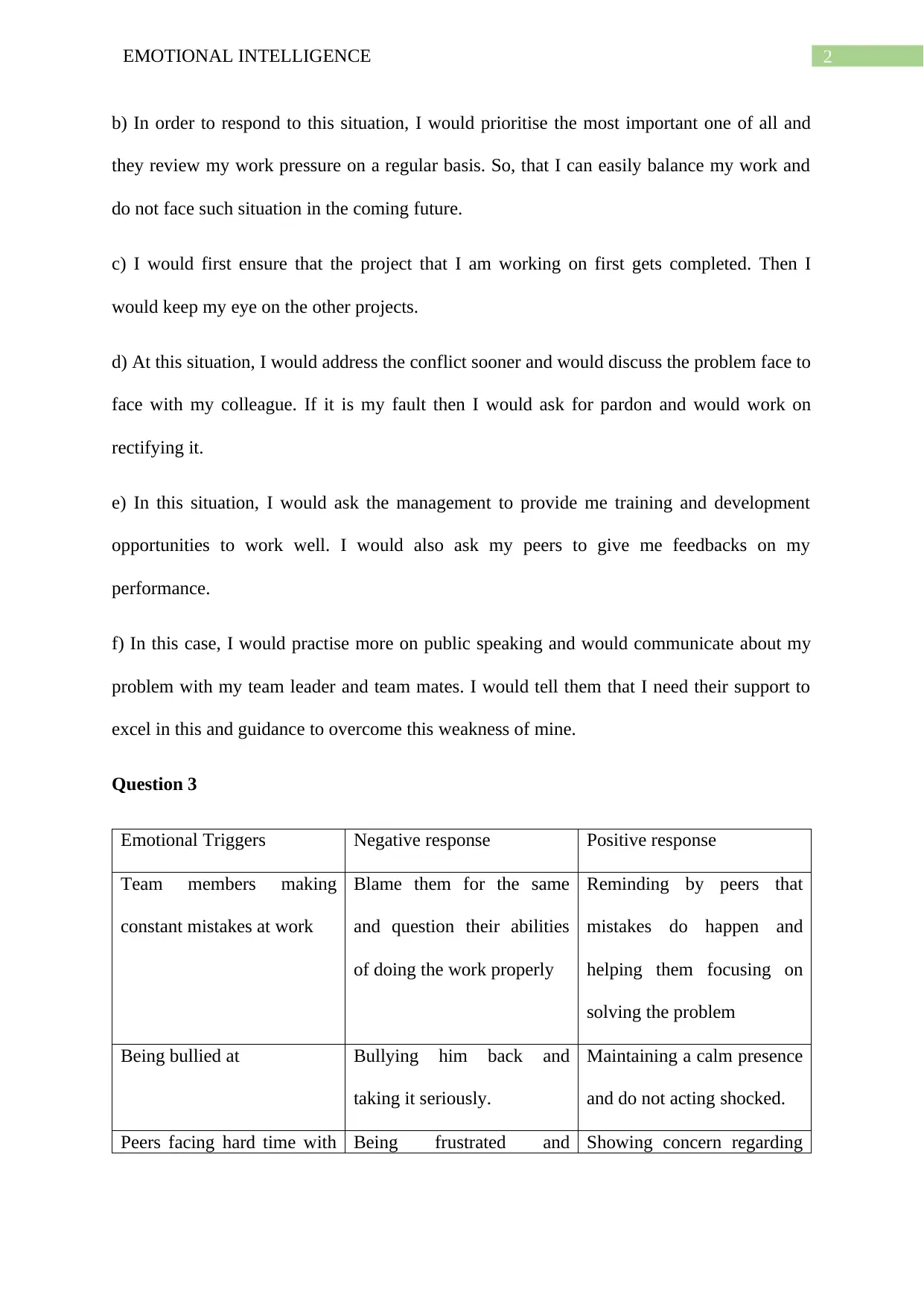
2EMOTIONAL INTELLIGENCE
b) In order to respond to this situation, I would prioritise the most important one of all and
they review my work pressure on a regular basis. So, that I can easily balance my work and
do not face such situation in the coming future.
c) I would first ensure that the project that I am working on first gets completed. Then I
would keep my eye on the other projects.
d) At this situation, I would address the conflict sooner and would discuss the problem face to
face with my colleague. If it is my fault then I would ask for pardon and would work on
rectifying it.
e) In this situation, I would ask the management to provide me training and development
opportunities to work well. I would also ask my peers to give me feedbacks on my
performance.
f) In this case, I would practise more on public speaking and would communicate about my
problem with my team leader and team mates. I would tell them that I need their support to
excel in this and guidance to overcome this weakness of mine.
Question 3
Emotional Triggers Negative response Positive response
Team members making
constant mistakes at work
Blame them for the same
and question their abilities
of doing the work properly
Reminding by peers that
mistakes do happen and
helping them focusing on
solving the problem
Being bullied at Bullying him back and
taking it seriously.
Maintaining a calm presence
and do not acting shocked.
Peers facing hard time with Being frustrated and Showing concern regarding
b) In order to respond to this situation, I would prioritise the most important one of all and
they review my work pressure on a regular basis. So, that I can easily balance my work and
do not face such situation in the coming future.
c) I would first ensure that the project that I am working on first gets completed. Then I
would keep my eye on the other projects.
d) At this situation, I would address the conflict sooner and would discuss the problem face to
face with my colleague. If it is my fault then I would ask for pardon and would work on
rectifying it.
e) In this situation, I would ask the management to provide me training and development
opportunities to work well. I would also ask my peers to give me feedbacks on my
performance.
f) In this case, I would practise more on public speaking and would communicate about my
problem with my team leader and team mates. I would tell them that I need their support to
excel in this and guidance to overcome this weakness of mine.
Question 3
Emotional Triggers Negative response Positive response
Team members making
constant mistakes at work
Blame them for the same
and question their abilities
of doing the work properly
Reminding by peers that
mistakes do happen and
helping them focusing on
solving the problem
Being bullied at Bullying him back and
taking it seriously.
Maintaining a calm presence
and do not acting shocked.
Peers facing hard time with Being frustrated and Showing concern regarding
⊘ This is a preview!⊘
Do you want full access?
Subscribe today to unlock all pages.

Trusted by 1+ million students worldwide
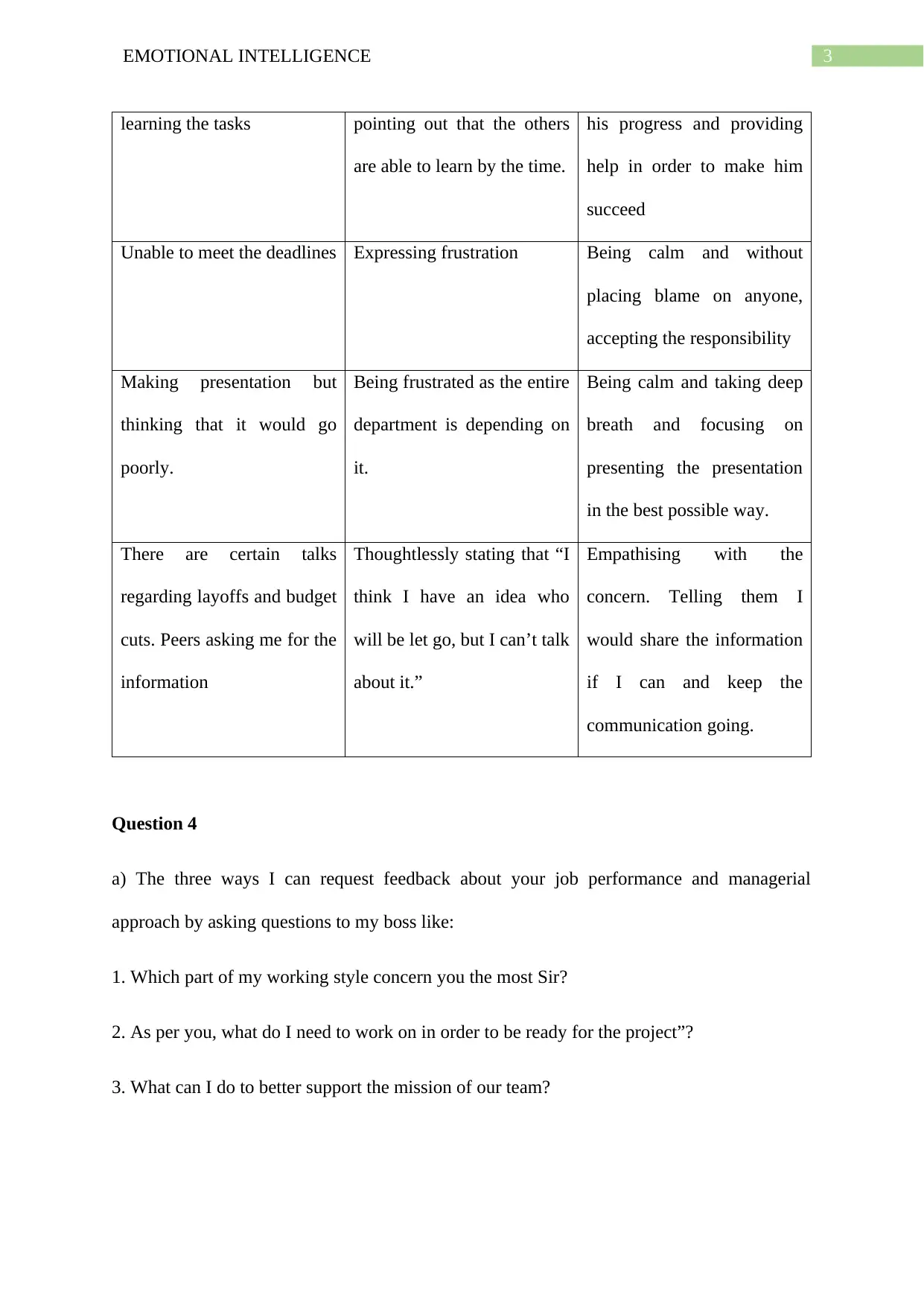
3EMOTIONAL INTELLIGENCE
learning the tasks pointing out that the others
are able to learn by the time.
his progress and providing
help in order to make him
succeed
Unable to meet the deadlines Expressing frustration Being calm and without
placing blame on anyone,
accepting the responsibility
Making presentation but
thinking that it would go
poorly.
Being frustrated as the entire
department is depending on
it.
Being calm and taking deep
breath and focusing on
presenting the presentation
in the best possible way.
There are certain talks
regarding layoffs and budget
cuts. Peers asking me for the
information
Thoughtlessly stating that “I
think I have an idea who
will be let go, but I can’t talk
about it.”
Empathising with the
concern. Telling them I
would share the information
if I can and keep the
communication going.
Question 4
a) The three ways I can request feedback about your job performance and managerial
approach by asking questions to my boss like:
1. Which part of my working style concern you the most Sir?
2. As per you, what do I need to work on in order to be ready for the project”?
3. What can I do to better support the mission of our team?
learning the tasks pointing out that the others
are able to learn by the time.
his progress and providing
help in order to make him
succeed
Unable to meet the deadlines Expressing frustration Being calm and without
placing blame on anyone,
accepting the responsibility
Making presentation but
thinking that it would go
poorly.
Being frustrated as the entire
department is depending on
it.
Being calm and taking deep
breath and focusing on
presenting the presentation
in the best possible way.
There are certain talks
regarding layoffs and budget
cuts. Peers asking me for the
information
Thoughtlessly stating that “I
think I have an idea who
will be let go, but I can’t talk
about it.”
Empathising with the
concern. Telling them I
would share the information
if I can and keep the
communication going.
Question 4
a) The three ways I can request feedback about your job performance and managerial
approach by asking questions to my boss like:
1. Which part of my working style concern you the most Sir?
2. As per you, what do I need to work on in order to be ready for the project”?
3. What can I do to better support the mission of our team?
Paraphrase This Document
Need a fresh take? Get an instant paraphrase of this document with our AI Paraphraser
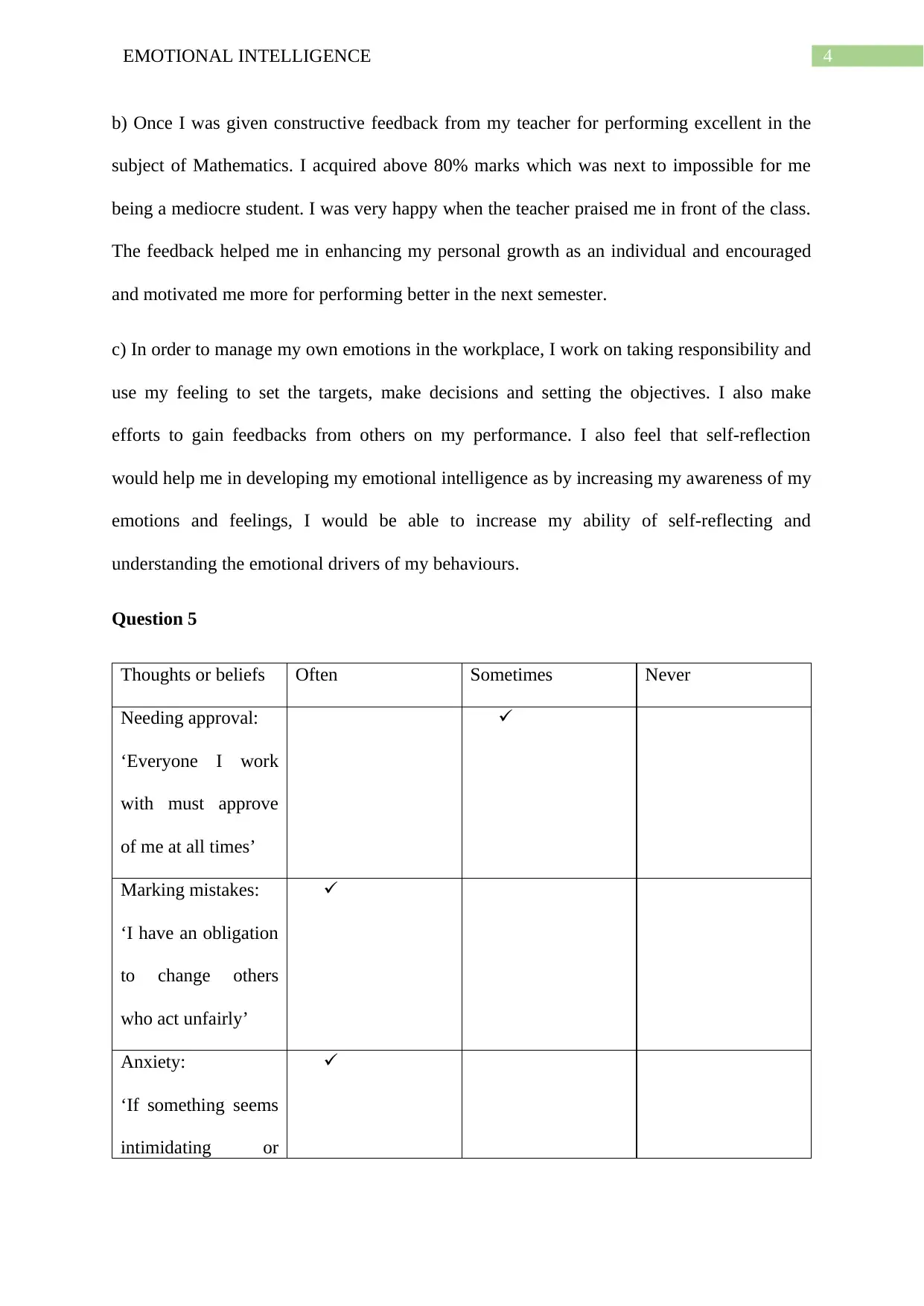
4EMOTIONAL INTELLIGENCE
b) Once I was given constructive feedback from my teacher for performing excellent in the
subject of Mathematics. I acquired above 80% marks which was next to impossible for me
being a mediocre student. I was very happy when the teacher praised me in front of the class.
The feedback helped me in enhancing my personal growth as an individual and encouraged
and motivated me more for performing better in the next semester.
c) In order to manage my own emotions in the workplace, I work on taking responsibility and
use my feeling to set the targets, make decisions and setting the objectives. I also make
efforts to gain feedbacks from others on my performance. I also feel that self-reflection
would help me in developing my emotional intelligence as by increasing my awareness of my
emotions and feelings, I would be able to increase my ability of self-reflecting and
understanding the emotional drivers of my behaviours.
Question 5
Thoughts or beliefs Often Sometimes Never
Needing approval:
‘Everyone I work
with must approve
of me at all times’
Marking mistakes:
‘I have an obligation
to change others
who act unfairly’
Anxiety:
‘If something seems
intimidating or
b) Once I was given constructive feedback from my teacher for performing excellent in the
subject of Mathematics. I acquired above 80% marks which was next to impossible for me
being a mediocre student. I was very happy when the teacher praised me in front of the class.
The feedback helped me in enhancing my personal growth as an individual and encouraged
and motivated me more for performing better in the next semester.
c) In order to manage my own emotions in the workplace, I work on taking responsibility and
use my feeling to set the targets, make decisions and setting the objectives. I also make
efforts to gain feedbacks from others on my performance. I also feel that self-reflection
would help me in developing my emotional intelligence as by increasing my awareness of my
emotions and feelings, I would be able to increase my ability of self-reflecting and
understanding the emotional drivers of my behaviours.
Question 5
Thoughts or beliefs Often Sometimes Never
Needing approval:
‘Everyone I work
with must approve
of me at all times’
Marking mistakes:
‘I have an obligation
to change others
who act unfairly’
Anxiety:
‘If something seems
intimidating or
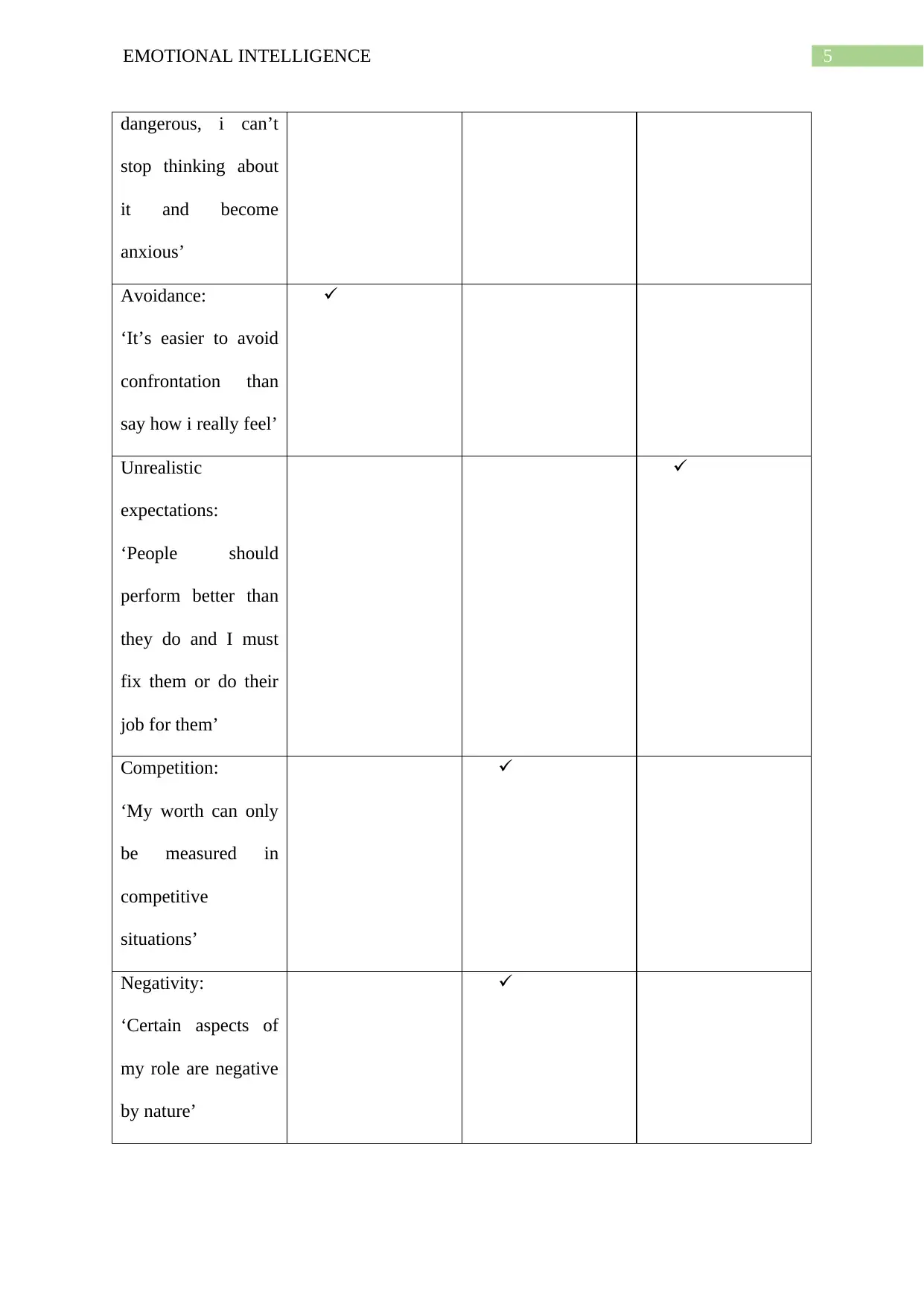
5EMOTIONAL INTELLIGENCE
dangerous, i can’t
stop thinking about
it and become
anxious’
Avoidance:
‘It’s easier to avoid
confrontation than
say how i really feel’
Unrealistic
expectations:
‘People should
perform better than
they do and I must
fix them or do their
job for them’
Competition:
‘My worth can only
be measured in
competitive
situations’
Negativity:
‘Certain aspects of
my role are negative
by nature’
dangerous, i can’t
stop thinking about
it and become
anxious’
Avoidance:
‘It’s easier to avoid
confrontation than
say how i really feel’
Unrealistic
expectations:
‘People should
perform better than
they do and I must
fix them or do their
job for them’
Competition:
‘My worth can only
be measured in
competitive
situations’
Negativity:
‘Certain aspects of
my role are negative
by nature’
⊘ This is a preview!⊘
Do you want full access?
Subscribe today to unlock all pages.

Trusted by 1+ million students worldwide
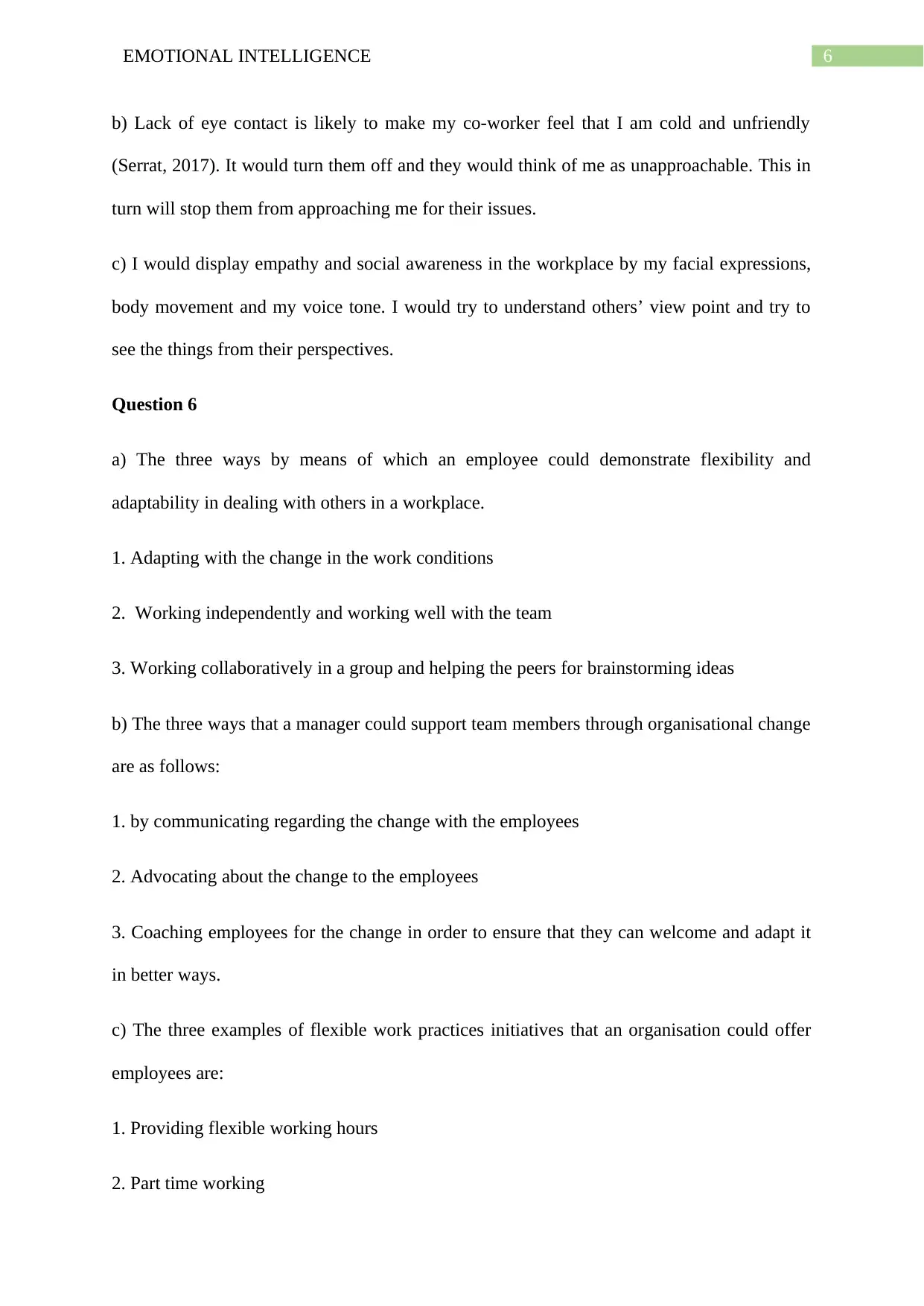
6EMOTIONAL INTELLIGENCE
b) Lack of eye contact is likely to make my co-worker feel that I am cold and unfriendly
(Serrat, 2017). It would turn them off and they would think of me as unapproachable. This in
turn will stop them from approaching me for their issues.
c) I would display empathy and social awareness in the workplace by my facial expressions,
body movement and my voice tone. I would try to understand others’ view point and try to
see the things from their perspectives.
Question 6
a) The three ways by means of which an employee could demonstrate flexibility and
adaptability in dealing with others in a workplace.
1. Adapting with the change in the work conditions
2. Working independently and working well with the team
3. Working collaboratively in a group and helping the peers for brainstorming ideas
b) The three ways that a manager could support team members through organisational change
are as follows:
1. by communicating regarding the change with the employees
2. Advocating about the change to the employees
3. Coaching employees for the change in order to ensure that they can welcome and adapt it
in better ways.
c) The three examples of flexible work practices initiatives that an organisation could offer
employees are:
1. Providing flexible working hours
2. Part time working
b) Lack of eye contact is likely to make my co-worker feel that I am cold and unfriendly
(Serrat, 2017). It would turn them off and they would think of me as unapproachable. This in
turn will stop them from approaching me for their issues.
c) I would display empathy and social awareness in the workplace by my facial expressions,
body movement and my voice tone. I would try to understand others’ view point and try to
see the things from their perspectives.
Question 6
a) The three ways by means of which an employee could demonstrate flexibility and
adaptability in dealing with others in a workplace.
1. Adapting with the change in the work conditions
2. Working independently and working well with the team
3. Working collaboratively in a group and helping the peers for brainstorming ideas
b) The three ways that a manager could support team members through organisational change
are as follows:
1. by communicating regarding the change with the employees
2. Advocating about the change to the employees
3. Coaching employees for the change in order to ensure that they can welcome and adapt it
in better ways.
c) The three examples of flexible work practices initiatives that an organisation could offer
employees are:
1. Providing flexible working hours
2. Part time working
Paraphrase This Document
Need a fresh take? Get an instant paraphrase of this document with our AI Paraphraser
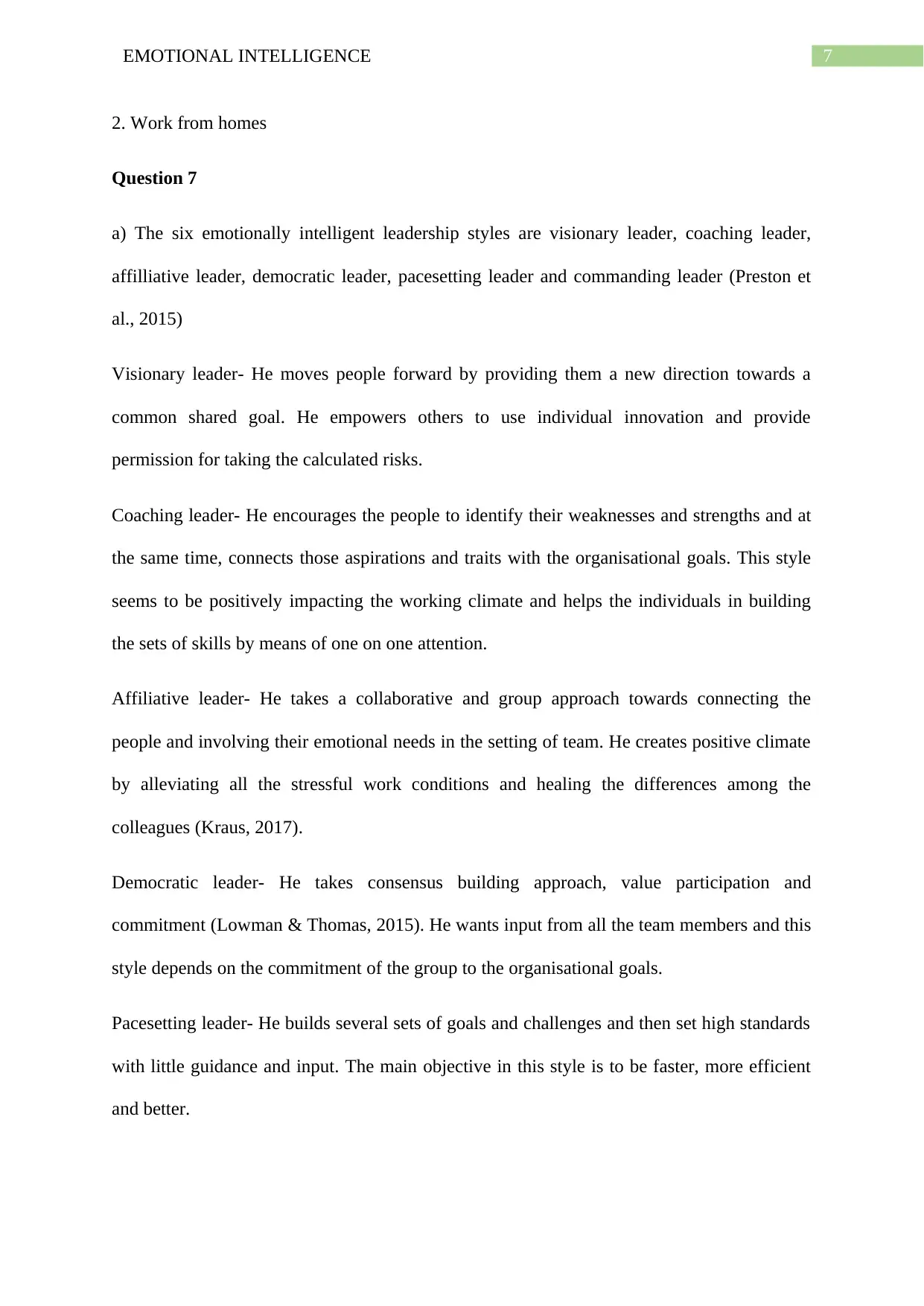
7EMOTIONAL INTELLIGENCE
2. Work from homes
Question 7
a) The six emotionally intelligent leadership styles are visionary leader, coaching leader,
affilliative leader, democratic leader, pacesetting leader and commanding leader (Preston et
al., 2015)
Visionary leader- He moves people forward by providing them a new direction towards a
common shared goal. He empowers others to use individual innovation and provide
permission for taking the calculated risks.
Coaching leader- He encourages the people to identify their weaknesses and strengths and at
the same time, connects those aspirations and traits with the organisational goals. This style
seems to be positively impacting the working climate and helps the individuals in building
the sets of skills by means of one on one attention.
Affiliative leader- He takes a collaborative and group approach towards connecting the
people and involving their emotional needs in the setting of team. He creates positive climate
by alleviating all the stressful work conditions and healing the differences among the
colleagues (Kraus, 2017).
Democratic leader- He takes consensus building approach, value participation and
commitment (Lowman & Thomas, 2015). He wants input from all the team members and this
style depends on the commitment of the group to the organisational goals.
Pacesetting leader- He builds several sets of goals and challenges and then set high standards
with little guidance and input. The main objective in this style is to be faster, more efficient
and better.
2. Work from homes
Question 7
a) The six emotionally intelligent leadership styles are visionary leader, coaching leader,
affilliative leader, democratic leader, pacesetting leader and commanding leader (Preston et
al., 2015)
Visionary leader- He moves people forward by providing them a new direction towards a
common shared goal. He empowers others to use individual innovation and provide
permission for taking the calculated risks.
Coaching leader- He encourages the people to identify their weaknesses and strengths and at
the same time, connects those aspirations and traits with the organisational goals. This style
seems to be positively impacting the working climate and helps the individuals in building
the sets of skills by means of one on one attention.
Affiliative leader- He takes a collaborative and group approach towards connecting the
people and involving their emotional needs in the setting of team. He creates positive climate
by alleviating all the stressful work conditions and healing the differences among the
colleagues (Kraus, 2017).
Democratic leader- He takes consensus building approach, value participation and
commitment (Lowman & Thomas, 2015). He wants input from all the team members and this
style depends on the commitment of the group to the organisational goals.
Pacesetting leader- He builds several sets of goals and challenges and then set high standards
with little guidance and input. The main objective in this style is to be faster, more efficient
and better.
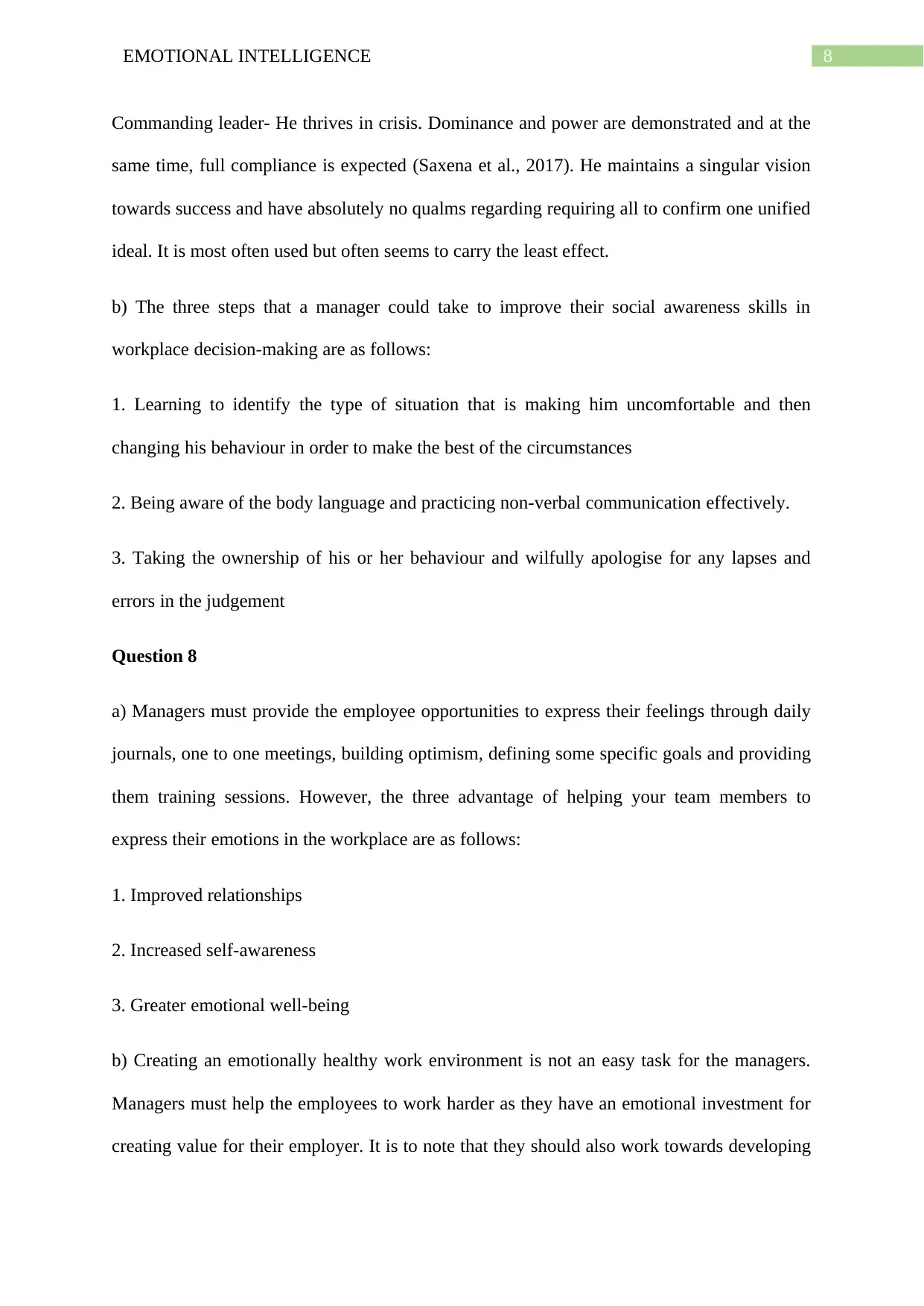
8EMOTIONAL INTELLIGENCE
Commanding leader- He thrives in crisis. Dominance and power are demonstrated and at the
same time, full compliance is expected (Saxena et al., 2017). He maintains a singular vision
towards success and have absolutely no qualms regarding requiring all to confirm one unified
ideal. It is most often used but often seems to carry the least effect.
b) The three steps that a manager could take to improve their social awareness skills in
workplace decision-making are as follows:
1. Learning to identify the type of situation that is making him uncomfortable and then
changing his behaviour in order to make the best of the circumstances
2. Being aware of the body language and practicing non-verbal communication effectively.
3. Taking the ownership of his or her behaviour and wilfully apologise for any lapses and
errors in the judgement
Question 8
a) Managers must provide the employee opportunities to express their feelings through daily
journals, one to one meetings, building optimism, defining some specific goals and providing
them training sessions. However, the three advantage of helping your team members to
express their emotions in the workplace are as follows:
1. Improved relationships
2. Increased self-awareness
3. Greater emotional well-being
b) Creating an emotionally healthy work environment is not an easy task for the managers.
Managers must help the employees to work harder as they have an emotional investment for
creating value for their employer. It is to note that they should also work towards developing
Commanding leader- He thrives in crisis. Dominance and power are demonstrated and at the
same time, full compliance is expected (Saxena et al., 2017). He maintains a singular vision
towards success and have absolutely no qualms regarding requiring all to confirm one unified
ideal. It is most often used but often seems to carry the least effect.
b) The three steps that a manager could take to improve their social awareness skills in
workplace decision-making are as follows:
1. Learning to identify the type of situation that is making him uncomfortable and then
changing his behaviour in order to make the best of the circumstances
2. Being aware of the body language and practicing non-verbal communication effectively.
3. Taking the ownership of his or her behaviour and wilfully apologise for any lapses and
errors in the judgement
Question 8
a) Managers must provide the employee opportunities to express their feelings through daily
journals, one to one meetings, building optimism, defining some specific goals and providing
them training sessions. However, the three advantage of helping your team members to
express their emotions in the workplace are as follows:
1. Improved relationships
2. Increased self-awareness
3. Greater emotional well-being
b) Creating an emotionally healthy work environment is not an easy task for the managers.
Managers must help the employees to work harder as they have an emotional investment for
creating value for their employer. It is to note that they should also work towards developing
⊘ This is a preview!⊘
Do you want full access?
Subscribe today to unlock all pages.

Trusted by 1+ million students worldwide
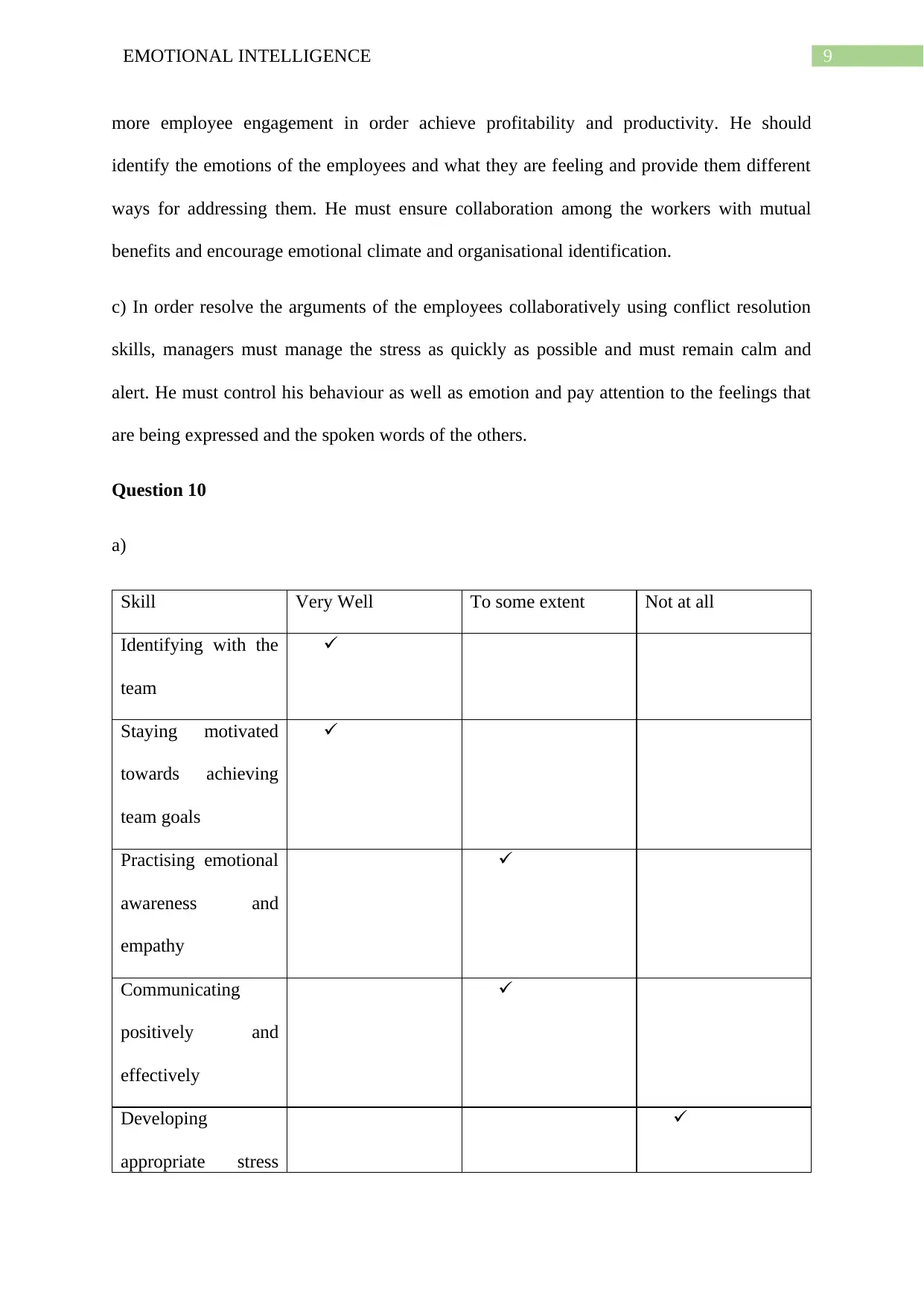
9EMOTIONAL INTELLIGENCE
more employee engagement in order achieve profitability and productivity. He should
identify the emotions of the employees and what they are feeling and provide them different
ways for addressing them. He must ensure collaboration among the workers with mutual
benefits and encourage emotional climate and organisational identification.
c) In order resolve the arguments of the employees collaboratively using conflict resolution
skills, managers must manage the stress as quickly as possible and must remain calm and
alert. He must control his behaviour as well as emotion and pay attention to the feelings that
are being expressed and the spoken words of the others.
Question 10
a)
Skill Very Well To some extent Not at all
Identifying with the
team
Staying motivated
towards achieving
team goals
Practising emotional
awareness and
empathy
Communicating
positively and
effectively
Developing
appropriate stress
more employee engagement in order achieve profitability and productivity. He should
identify the emotions of the employees and what they are feeling and provide them different
ways for addressing them. He must ensure collaboration among the workers with mutual
benefits and encourage emotional climate and organisational identification.
c) In order resolve the arguments of the employees collaboratively using conflict resolution
skills, managers must manage the stress as quickly as possible and must remain calm and
alert. He must control his behaviour as well as emotion and pay attention to the feelings that
are being expressed and the spoken words of the others.
Question 10
a)
Skill Very Well To some extent Not at all
Identifying with the
team
Staying motivated
towards achieving
team goals
Practising emotional
awareness and
empathy
Communicating
positively and
effectively
Developing
appropriate stress
Paraphrase This Document
Need a fresh take? Get an instant paraphrase of this document with our AI Paraphraser
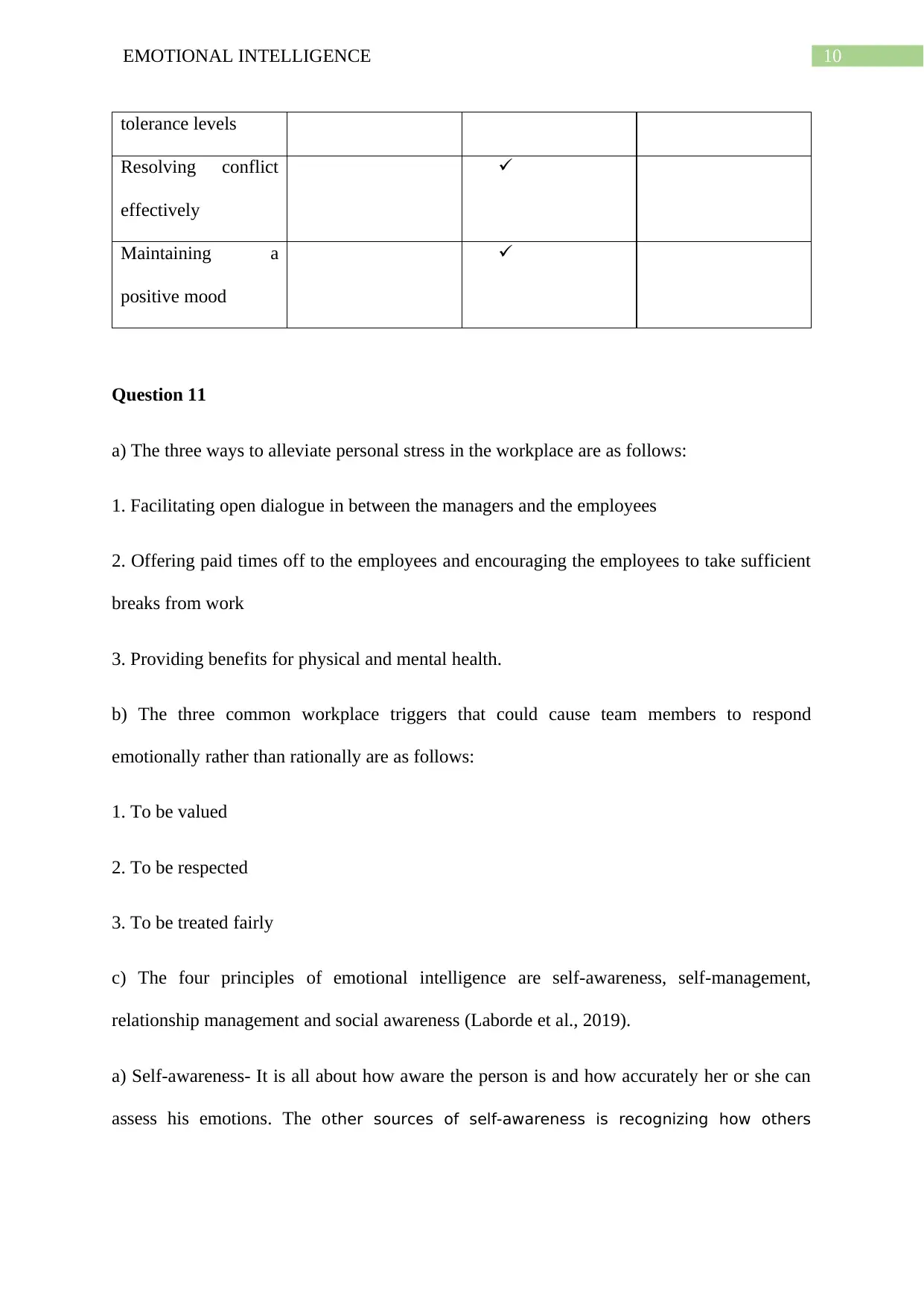
10EMOTIONAL INTELLIGENCE
tolerance levels
Resolving conflict
effectively
Maintaining a
positive mood
Question 11
a) The three ways to alleviate personal stress in the workplace are as follows:
1. Facilitating open dialogue in between the managers and the employees
2. Offering paid times off to the employees and encouraging the employees to take sufficient
breaks from work
3. Providing benefits for physical and mental health.
b) The three common workplace triggers that could cause team members to respond
emotionally rather than rationally are as follows:
1. To be valued
2. To be respected
3. To be treated fairly
c) The four principles of emotional intelligence are self-awareness, self-management,
relationship management and social awareness (Laborde et al., 2019).
a) Self-awareness- It is all about how aware the person is and how accurately her or she can
assess his emotions. The other sources of self-awareness is recognizing how others
tolerance levels
Resolving conflict
effectively
Maintaining a
positive mood
Question 11
a) The three ways to alleviate personal stress in the workplace are as follows:
1. Facilitating open dialogue in between the managers and the employees
2. Offering paid times off to the employees and encouraging the employees to take sufficient
breaks from work
3. Providing benefits for physical and mental health.
b) The three common workplace triggers that could cause team members to respond
emotionally rather than rationally are as follows:
1. To be valued
2. To be respected
3. To be treated fairly
c) The four principles of emotional intelligence are self-awareness, self-management,
relationship management and social awareness (Laborde et al., 2019).
a) Self-awareness- It is all about how aware the person is and how accurately her or she can
assess his emotions. The other sources of self-awareness is recognizing how others
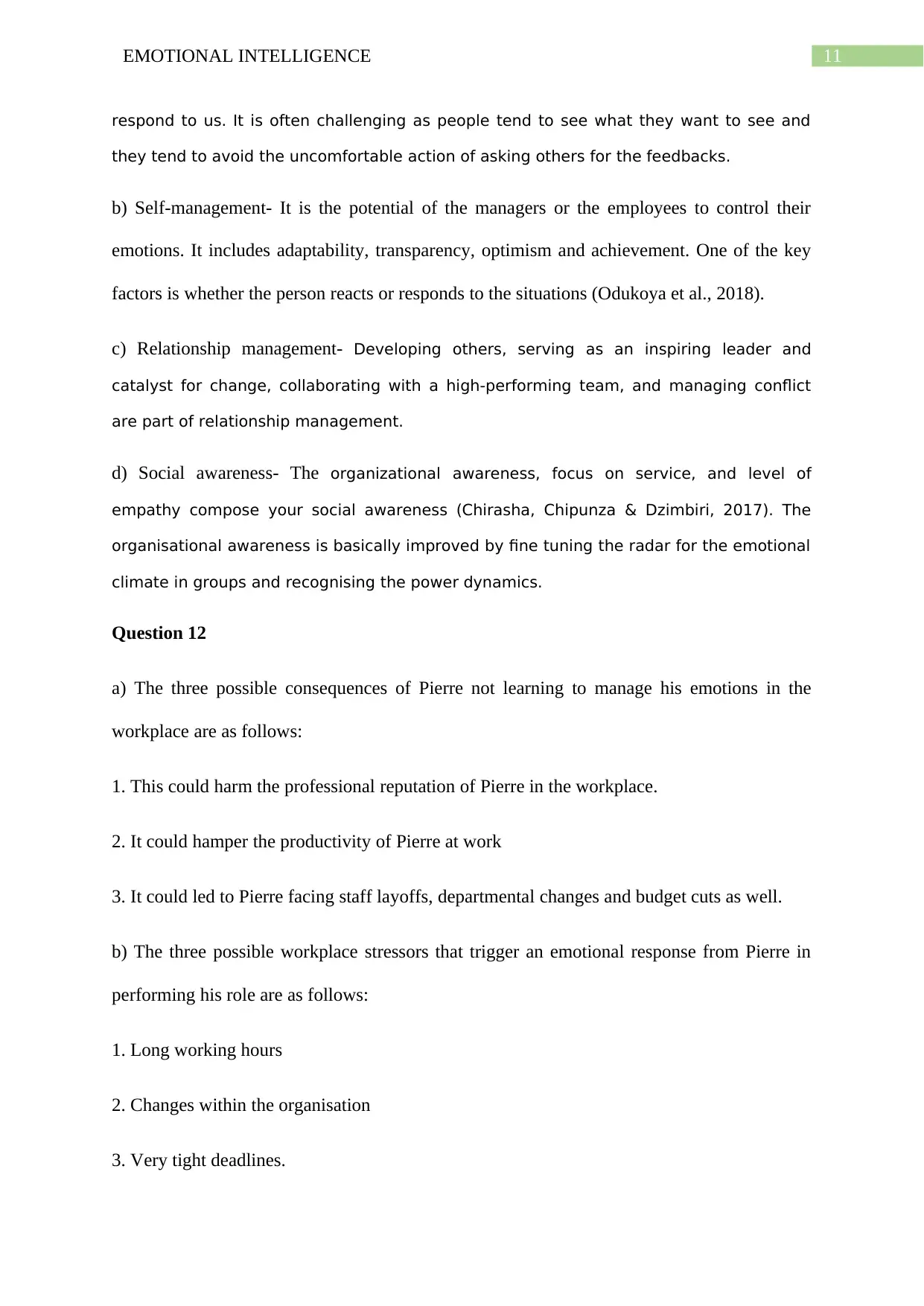
11EMOTIONAL INTELLIGENCE
respond to us. It is often challenging as people tend to see what they want to see and
they tend to avoid the uncomfortable action of asking others for the feedbacks.
b) Self-management- It is the potential of the managers or the employees to control their
emotions. It includes adaptability, transparency, optimism and achievement. One of the key
factors is whether the person reacts or responds to the situations (Odukoya et al., 2018).
c) Relationship management- Developing others, serving as an inspiring leader and
catalyst for change, collaborating with a high-performing team, and managing conflict
are part of relationship management.
d) Social awareness- The organizational awareness, focus on service, and level of
empathy compose your social awareness (Chirasha, Chipunza & Dzimbiri, 2017). The
organisational awareness is basically improved by fine tuning the radar for the emotional
climate in groups and recognising the power dynamics.
Question 12
a) The three possible consequences of Pierre not learning to manage his emotions in the
workplace are as follows:
1. This could harm the professional reputation of Pierre in the workplace.
2. It could hamper the productivity of Pierre at work
3. It could led to Pierre facing staff layoffs, departmental changes and budget cuts as well.
b) The three possible workplace stressors that trigger an emotional response from Pierre in
performing his role are as follows:
1. Long working hours
2. Changes within the organisation
3. Very tight deadlines.
respond to us. It is often challenging as people tend to see what they want to see and
they tend to avoid the uncomfortable action of asking others for the feedbacks.
b) Self-management- It is the potential of the managers or the employees to control their
emotions. It includes adaptability, transparency, optimism and achievement. One of the key
factors is whether the person reacts or responds to the situations (Odukoya et al., 2018).
c) Relationship management- Developing others, serving as an inspiring leader and
catalyst for change, collaborating with a high-performing team, and managing conflict
are part of relationship management.
d) Social awareness- The organizational awareness, focus on service, and level of
empathy compose your social awareness (Chirasha, Chipunza & Dzimbiri, 2017). The
organisational awareness is basically improved by fine tuning the radar for the emotional
climate in groups and recognising the power dynamics.
Question 12
a) The three possible consequences of Pierre not learning to manage his emotions in the
workplace are as follows:
1. This could harm the professional reputation of Pierre in the workplace.
2. It could hamper the productivity of Pierre at work
3. It could led to Pierre facing staff layoffs, departmental changes and budget cuts as well.
b) The three possible workplace stressors that trigger an emotional response from Pierre in
performing his role are as follows:
1. Long working hours
2. Changes within the organisation
3. Very tight deadlines.
⊘ This is a preview!⊘
Do you want full access?
Subscribe today to unlock all pages.

Trusted by 1+ million students worldwide
1 out of 16
Related Documents
Your All-in-One AI-Powered Toolkit for Academic Success.
+13062052269
info@desklib.com
Available 24*7 on WhatsApp / Email
![[object Object]](/_next/static/media/star-bottom.7253800d.svg)
Unlock your academic potential
Copyright © 2020–2026 A2Z Services. All Rights Reserved. Developed and managed by ZUCOL.





